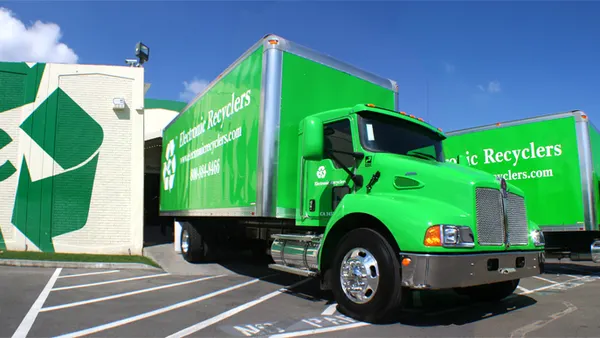Dive Brief:
- The Connecticut Department of Energy and Environmental Protection (DEEP) announced it will help facilitate $5 million worth of recycling infrastructure investment from Closed Loop Fund (CLF) in 2018. This is CLF's first state agency partnership.
- This funding will come in the usual form of 0% interest loans for municipalities and below-market loans for companies. Per an upcoming memorandum of understanding, the DEEP will help with "the identification and initial due diligence screening for applicants." CLF will make the final decision on all applications.
- CLF's recent $2.6 million investment in new recycling carts for the city of Waterbury — which has a goal to increase its diversion rate from 6% to 25% over three years — was cited as an example for what's possible. DEEP Commissioner Rob Klee, in a press release, said this funding opportunity would be particularly useful in "challenging budgetary times."
Dive Insight:
CLF, part of Closed Loop Partners, has set a goal of investing $100 million in recycling programs by 2020. This comes from a slew of high-profile corporate backers, which view it as an opportunity to increase recycled content feedstock, ensure higher recovery rates for their products and see a good return on investment.
In turn, this "catalytic capital" can "unlock" co-investment from local governments or private companies and accelerate the pace of infrastructure development. Unlike the current capital market for disposal infrastructure, recycling investment is seen as less reliable due to market fluctuations and doesn't get as much attention. Yet according to large companies such as Waste Management that are in a position to do it, spending capital on recycling can also have a higher return on investment.
As of June 2017, when CLF released its most recent progress report, $25 million had been invested so far and that had leveraged $64 million in co-investment. According to a recent SWANApalooza presentation, that has since climbed to $35 million and $90 million in co-investment. The main goal is to expand material recovery facility (MRF) capabilities and domestic end markets in an effort to grow regional supply chains.
Yet working with regional and municipal governments to achieve these goals has proven slower than expected due to political turnover, skepticism of the no-interest loans and other factors. Partnering with a state agency is seen as a chance to accelerate the process by expanding CLF's reach and credibility among the state's 169 municipalities. CLF is interested in taking this model to other states and potentially continuing the DEEP partnership into future years if the $5 million can be disbursed in 2018.
Connecticut is seen as a good place to start in part because of Commissioner Rob Klee's nickname as "Dr. Trash" and the DEEP's interest in sustainable materials management. The state has set a goal of achieving 60% diversion by 2024, and is viewed as a model for its 2017 standardized recycling campaign, but has also run into opposition on policies such as extended producer responsibility for packaging. The concluding report on EPR cited both CLF and The Recycling Partnership as possible funding resources for local recycling programs.
This initial $5 million could go toward collection systems to capture more clean tonnage, MRF technology to deal with contamination and increase efficiency, end markets for regionally challenging material such as glass, or even organics processing capacity as part of a broader integrated solution.











